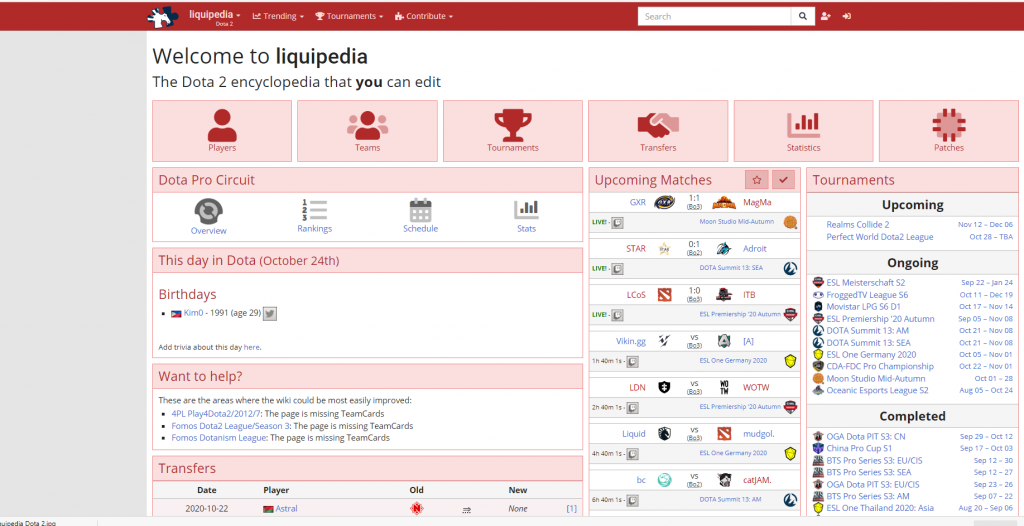Liquipedia, esports wiki network and tournament listing page, has issued a detailed response to reports of a series of fake Dota 2 tournaments and team imitations. These spoofed tournaments and team performances were used to attempt to fix matches for betting sites, or manipulate legitimate events with fake results.
Earlier this year Liquipedia became aware that some bad actors were taking advantage of Liquipedia’s Dota 2 event listing in order to conduct match-fixing.
— Liquipedia (@LiquipediaNet) October 23, 2020
Read our full statement here: https://t.co/8Gyxz2D2fi
In a post on the Dota 2 subreddit, the website’s representatives described the issue. According to Liquipedia a number of “bad actors” had used the wiki to bring legitimacy for their fake accounts or spoofed matches.
As per the post: “Almost weekly, we’ve seen submissions of fabricated Dota 2 tournaments, tournament organizers, and teams to the wiki. Bad actors know that having a page on Liquipedia is a stamp of legitimacy and that many betting sites connect to Liquipedia’s open API to track matches, tournaments, and results.
(Picture: Liquipedia)
This means that all it can take to have a match available for betting is for the tournament to have a page on Liquipedia.”
One notable example was the NA Summer Shuffle: A seemingly legitimate tournament with a lineup of recognisable teams. However, multiple organisations subsequently came forward to state they were not involved in the event. All evidence of the "tournament" has subsequently been deleted from Liquipedia.
List of teams participating
— NASummerShuffle (@ShuffleNa) June 22, 2020
1. Doze Reborn
2. Infinity Esports
3. Incubus Club
4. Omega Gaming
5. TriPALoSKy SQuad
6. Portland Burnsiders
7-12. TBD
Besides this, legitimate tournaments and teams are allegedly frequently coerced by the same bad actors into joining in on match-fixing. Liquipedia’s own volunteers have reportedly received abuse from the scammers, being insulted, harassed, threatened, and doxxed in a effort to keep fake tournament listings on the site.
Liquipedia, which is associated with esports organisation Team Liquid, is largely contributed to by volunteers. In several games, the wiki is the single most valuable resource for the competitive scene, with Dota 2 and CS:GO heavily utilising the site. For smaller tournaments, without the clout or money to make themselves seen on social media or host their own website, Liquipedia is often the only way they have themselves heard.
Liquipedia is the home of Dota 2 esports. (Picture: Liquipedia)
It is this emmenince that makes Liquipedia the conduit for match fixing as many betting platforms use Liquipedia's API for tournament listings and results.
In response to the match-fixing issues, Liquipedia has moved to apply more stringent guidelines for its verification process. These include Dota 2 ticket checking, the existence of a public ruleset/roster info, official announcements, sponsor verification.
Individually these efforts are minimal, and could still be subject to spoofing. However, together they decentivise match-fixing and team spoofing by making it more work than it’s worth.
However, in the Reddit post Liquipedia also calls for more efforts in battling match-fixing. They call on Valve to improve the vetting process for tournament tickets, and investigate and enforce match-fixing rules. The post also calls for a more collaborative process between Valve and tournament organizers. Overall, the suggestions point to all parties putting in more work to help bring legitimacy to the scene and prevent “bad actors” from continuing with match-fixing.
The biggest incentive for most for wrongdoing is opportunity. In their current state the tier two and three scenes in Dota 2, especially in regions such as NA and the CIS, are highly exploitable. If all involved in the scene are willing to put more work into organisation, exposure, and diligence than the match-fixers, then match-fixing won't be worth the time.

 No ads, our video library,
No ads, our video library,



